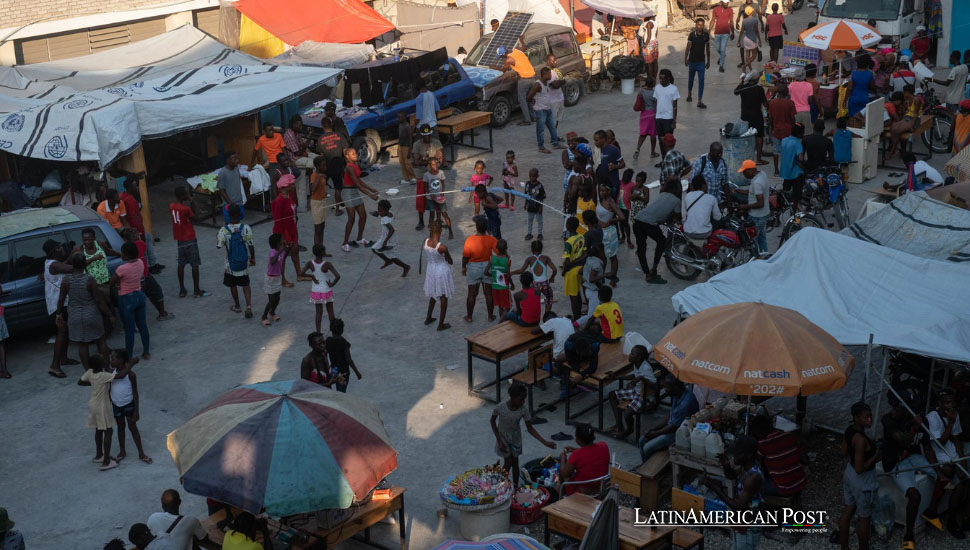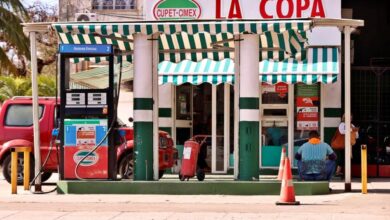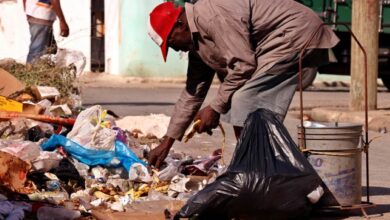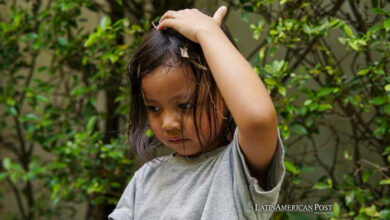Haiti’s Children Caught in the Crossfire: A Crisis Unfolds

As gang violence spirals out of control in Haiti, children are increasingly becoming the most vulnerable victims. With rising casualties and mass displacement, international efforts to protect these young lives remain critically inadequate.
In the turbulent streets of Port-au-Prince, Haiti’s capital, a mother desperately gathers her children and their belongings, fleeing the escalating violence that has engulfed her neighborhood in Lower Delmas. This scene, captured in a harrowing photograph, is emblematic of a crisis that has turned children into unintended targets in a battle they neither understand nor control.
The year 2024 has been particularly devastating for Haiti’s youngest citizens. According to Save the Children, at least 131 children have been killed or injured in the first six months of this year alone, many of them falling victim to stray bullets or violent reprisals. The charity warns that the actual number of casualties is likely much higher, with countless children suffering in silence, their stories lost amidst the chaos of gang warfare.
These tragic figures reflect the broader collapse of law and order in Haiti, where violent gangs have taken control of vast swathes of the capital, imposing their will through indiscriminate killings, kidnappings, and forced recruitment of minors. The government’s call for international assistance to bolster its under-resourced police force has so far yielded limited results, leaving the most vulnerable—Haiti’s children—exposed to unimaginable horrors.
A Fragile Response from the International Community
The international community’s response to Haiti’s plea for help has been sluggish. Despite the urgency of the situation, only 400 Kenyan police officers have been deployed as part of a U.N.-mandated mission to assist in restoring order. This small contingent is a far cry from the comprehensive security force needed to combat the well-armed and deeply entrenched gangs that terrorize the capital.
The inadequacy of the international response was starkly highlighted in late July when a Kenyan police mission to Ganthier, a community near the Dominican Republic border, was forced to retreat under heavy gang fire. The mission’s failure underscored the dangers of inadequate preparation and resources in such a volatile environment. The violence in Ganthier has displaced nearly 6,000 residents as of August 1st, adding to the growing number of internally displaced people across the country.
Save the Children and other humanitarian organizations have called on the U.N. Security Council to take more decisive action. They demand an end to the impunity enjoyed by those committing atrocities against children and urge all parties in Haiti to allow unimpeded access to humanitarian relief. Yet, the wheels of international diplomacy turn slowly, and the gap between promises and action continues to widen, leaving Haitian children to bear the brunt of the violence.
Schools Turned into Refugee Camps
The impact of the violence is felt acutely in the education sector, where schools—once sanctuaries of learning—have been transformed into makeshift refugee camps. As the October 1st school reopening date approaches, many institutions in the capital remain occupied by families displaced by the conflict. The number of internally displaced persons has soared to nearly 600,000, creating a humanitarian crisis that the country is ill-equipped to handle.
For the children of Haiti, the closure of schools represents more than just a disruption to their education. It signifies the loss of a safe space where they could briefly escape the turmoil of their daily lives. Now, these same buildings shelter families who have lost everything, their classrooms filled not with the sounds of learning but with the cries of those mourning lost loved ones and the clamor of survival in overcrowded conditions.
The disruption to education exacerbates the long-term effects of the violence. Without access to schooling, a generation of Haitian children faces a future of diminished opportunities, their potential stifled by the circumstances of their birth. The psychological toll of living in constant fear, combined with the loss of educational continuity, threatens to perpetuate the cycle of poverty and violence that has plagued Haiti for decades.
The Call for Immediate and Sustained Intervention
As the situation in Haiti deteriorates, the calls for more robust international intervention grow louder. Save the Children’s Haiti director Chantal Sylvie Imbeault emphasizes that behind every statistic is a real child whose life has been shattered by violence. “Entire neighborhoods have been burned, kidnappings and sexual assaults are rampant, and children are being directly targeted or caught in the crossfire,” Imbeault said, painting a grim picture of the reality on the ground.
The charity’s plea for immediate, sustained, and unimpeded humanitarian relief is a cry for help from a nation on the brink. The international community must heed this call and act decisively to protect Haiti’s most vulnerable citizens. This means increasing the number of peacekeepers on the ground and ensuring that these forces are adequately equipped to deal with the challenges they will face. It also requires a coordinated effort to provide the displaced and traumatized population with food, shelter, medical care, and psychological support.
Moreover, there must be a concerted push to hold those responsible for the violence accountable. The culture of impunity that has allowed gang leaders to operate with relative freedom must be dismantled. This will require significant political will within Haiti and the international community to support efforts to restore the rule of law and rebuild trust in governmental institutions.
Also read: U.S. Grants $110 Million to Haiti Amid Rising Gang Violence
The crisis in Haiti is a stark reminder of the fragility of peace and the devastating impact of unchecked violence on a population already grappling with poverty and instability. The children of Haiti are the silent victims of this conflict, their lives forever altered by the horrors they have witnessed and endured. As the world watches, the question remains: will the international community rise to the occasion and provide the support needed to protect these children, or will they be left to navigate this nightmare alone? The answer will determine not only the future of these young lives but also the fate of a nation struggling to survive amidst chaos.





